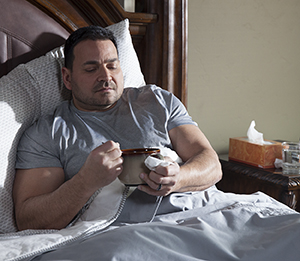Diabetes: Sick-Day Plan
Diabetes: Sick-Day Plan
Infections, the flu, and even a cold, can cause your blood sugar to rise. And, eating less, nausea, and vomiting may cause your blood glucose to fall (hypoglycemia). Ask your healthcare provider to help you develop a sick-day plan. The following information can help.
Don’ts
Don'ts include the following:
Diabetes medicines. Don’t stop taking your diabetes medicine.
Other medicines. Don’t take other medicines, such as those for colds or the flu, without checking with your healthcare provider.
Do’s
Do's include the following:
Eating. Stick to your meal plan. If you can’t eat, try fruit juice, regular gelatin, or frozen juice bars as directed by your healthcare provider.
Drinking. Drink at least 1 glass of liquid every hour. If you’re eating, these liquids should be sugar-free.
Blood glucose. Check your blood sugar as often as directed by your healthcare provider. You may need to check it more often than usual.
Ketones. Check your blood or urine for ketones. Ketones are the waste from burning fat instead of glucose for energy. Ketones are a warning sign of ketoacidosis. Ketoacidosis is a medical emergency. Ketoacidosis can happen to anyone with diabetes, but it's very rare in type 2 diabetes. It is usually only an issue if you have type 1 diabetes.
Diabetes medicines.
Adjust your insulin according to your sick-day plan. Don't skip insulin. You need insulin even if you can't eat your normal meals.
If you take pills for diabetes (oral medicines), take your normal dose unless your healthcare provider tells you something different.
Sugar-free medicines. Look for sugar-free cough drops and other medicines. Ask your healthcare provider if it’s OK for you to take these.
Getting help. If you're alone, ask someone to check on you several times a day.
Try to get all these supplies together before you need them.
Call your healthcare provider
Call your healthcare provider if you have any of the following:
You vomit or have diarrhea for more than 6 hours.
Your blood glucose level is higher than usual or more than 250 mg/dL after you have taken extra insulin (if recommended in your sick-day plan).
You take oral medicine for diabetes, and your blood sugar is higher than usual or over 250 mg/dL, before a meal and stays that high for more than 24 hours.
Your blood glucose is lower than usual or less than 70 mg/dL
You have moderate to large amounts of ketones in your blood or urine.
You aren’t better after 2 days.
Updated:
February 02, 2018
Reviewed By:
Brown, Kim, APRN,Hurd, Robert, MD,Image reviewed by StayWell art team.,Turley, Ray, BSN, MSN
